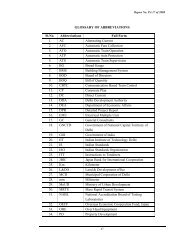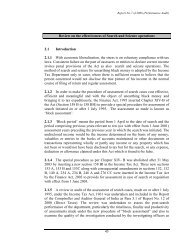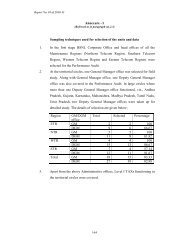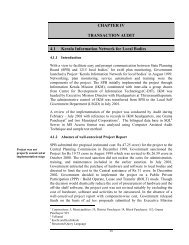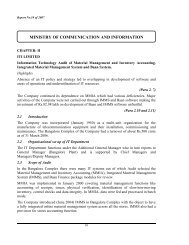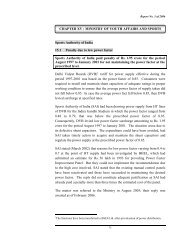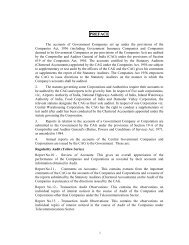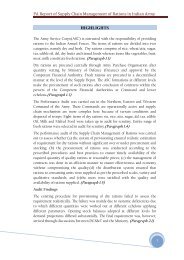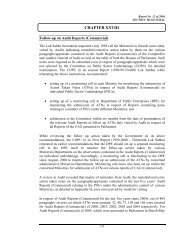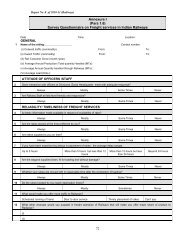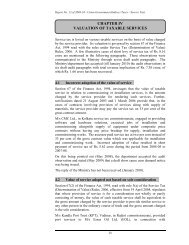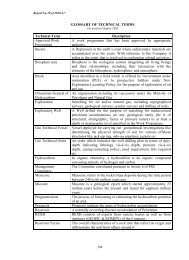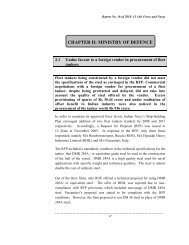Earnings - Comptroller and Auditor General of India
Earnings - Comptroller and Auditor General of India
Earnings - Comptroller and Auditor General of India
Create successful ePaper yourself
Turn your PDF publications into a flip-book with our unique Google optimized e-Paper software.
Report No.6 <strong>of</strong> 2006 (Railways)<strong>of</strong> Rs.8.79 crore during 2002-03 to 2004-05 due to non-revision <strong>of</strong> minimumweight condition.The matter was taken up with the Railway Board in June 2005. RailwayBoard in their reply have stated (August 2005) that revision <strong>of</strong> minimumweight condition (MWC) is under consideration <strong>and</strong> no loss is involved inmoving banana traffic since the BCN/BCX wagons return empty fromBhusawal division to stations on Northern Railway <strong>and</strong> New Delhi area. Onthe contrary Railways have been getting around 4 lakh tonne <strong>of</strong> banana trafficgenerating an earning <strong>of</strong> Rs.30 crore per annum.The Railway Board has accepted the need for revision <strong>of</strong> MWC to reducelosses to Railways on this account, as pointed out by Audit. Railway Board’sremarks that BCN/BCX wagons return empty from Bhusawal division <strong>and</strong>using them for banana traffic is advantageous, even if on concessional rates,have to be appreciated in the light <strong>of</strong> the fact that the Commercial Directorateitself has been supporting reduction in concession <strong>and</strong> it is expected that thisfactor would have been taken into account by the Commercial Directorate.2.1.3 South Western: Loss <strong>of</strong> earning capacity due to under-Railwayutilisation <strong>of</strong> Diesel Electric Multiple UnitservicesIntroduction <strong>of</strong> Diesel Electric Multiple Unit services in two sections on SouthWestern Railway, without assessing the needs for commuter traffic, resulted inunder-utilisation <strong>of</strong> assets (Rs.17.76 crore) <strong>and</strong> loss <strong>of</strong> earning capacity(Rs.0.67 crore)Diesel Electric Multiple Unit (DEMU) rakes are preferred over conventionallocal trains for commuter traffic in view <strong>of</strong> fast acceleration/ deceleration <strong>and</strong>operation on single lines since there is no engine turn round. These servicesare to be introduced where frequent up <strong>and</strong> down movement <strong>of</strong> trains in thesection is required on sections upto 160 Kms. or where the run is <strong>of</strong> not morethan four hours. DEMU rakes can carry almost one <strong>and</strong> a half times thepassengers which comparable passenger trains can carry.On a request made by a former Minister for Railways, South Western Railwayintroduced DEMU services (December 2003) in Bangalore city (SBC) –Chikballapur (CBP) <strong>and</strong> SBC-Whitefield (WFD) sections. No record inrespect <strong>of</strong> traffic survey or cost benefit analysis conducted prior tointroduction <strong>of</strong> these services was available with Railway Administration.Initially the services were introduced with 8 coaches but the composition waschanged subsequently to four coaches in view <strong>of</strong> poor occupancy. The servicebetween SBC <strong>and</strong> WFD was later extended upto Malur (MLO) from February2004. Despite these measures, the average occupancy <strong>of</strong> the services was 5 percent to 40 per cent only (April 2004) <strong>and</strong> after an analysis <strong>of</strong> these servicesover four months, the Railway Administration concluded that enoughsuburban traffic for operation <strong>of</strong> DEMU rakes did not exist. A review <strong>of</strong> theoccupancy position <strong>of</strong> the above services for the period from December 2003to October 2004 indicated that the occupancy was only 15.91 per cent for the24



